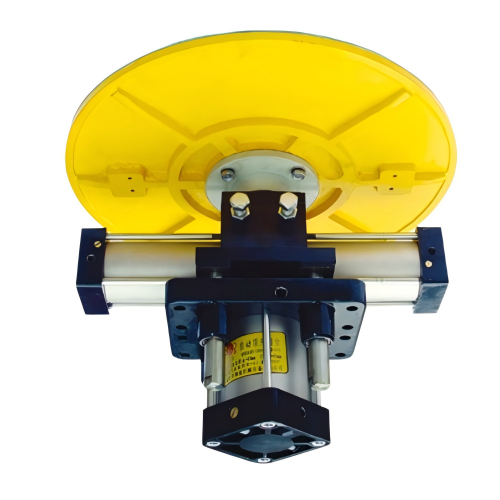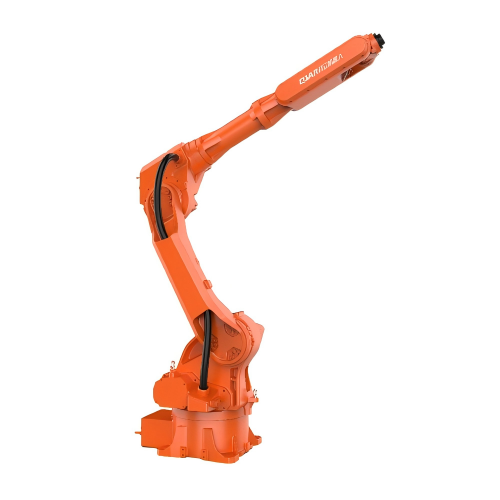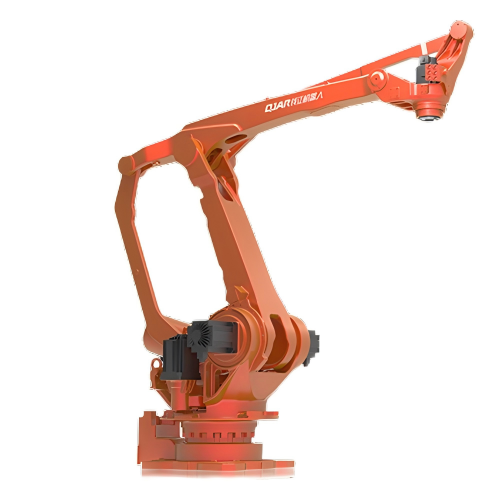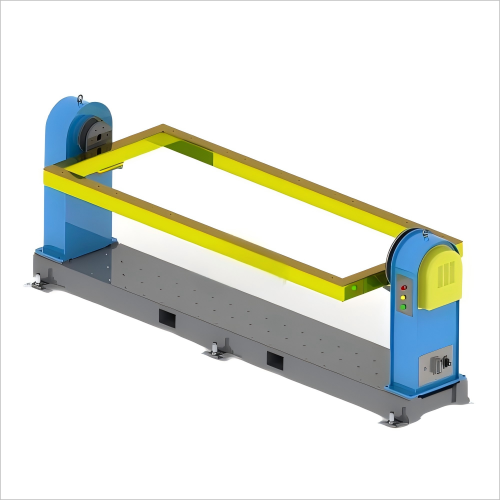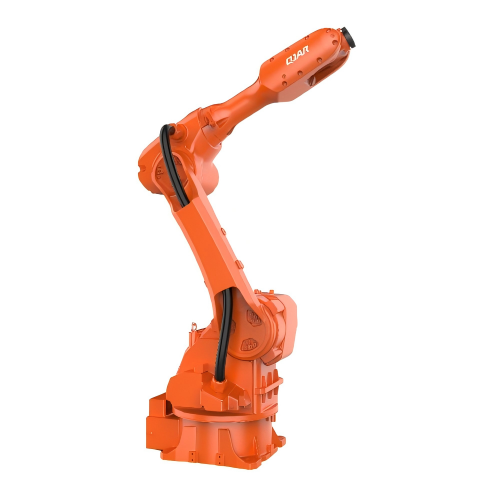
- Wenling zhejiang China
- [email protected]
- +86 18958695512
- Home
- PRODUCTS
- INDUSTRIAL ROBOT
- PALLETIZING ROBOT
- Pages
- Palletizing Robot 30kg Payload Fast Delivery Palletizer arm
Palletizing Robot 210kg Payload Fast Delivery Palletizer arm

As a leading manufacturer of industrial robotics, we specialize in high-performance palletizing robots designed to optimize efficiency, accuracy, and safety in material handling and logistics. Our palletizing robots are engineered to meet the growing demands of industries such as manufacturing, warehousing, food & beverage, and pharmaceuticals, providing automated, high-speed, and precise palletizing solutions.
Our palletizing robots are designed to boost productivity, reduce labor costs, and enhance workplace safety. Whether you need a standard model or a fully customized solution, we provide reliable, high-performance automation tailored to your needs.
QJRB210-1
CHINA
30DAYS
T/T
NINGBO/SHANGHAI CHINA
| Model | QJR210-1 | |
| Axis Number | 6 | |
| Payload | 210kg | |
| Repeat Positioning | ±0.2mm | |
| Max Armspan | 2688mm | |

How to Choose a Chinese Brand Robotic Palletizer
As automation increasingly transforms the global manufacturing and logistics landscape, robotic palletizers are becoming indispensable tools for businesses seeking efficiency, speed, and cost control. Chinese robotic palletizer brands have emerged as competitive players, offering affordable yet capable solutions. However, selecting the right Chinese brand involves more than comparing prices—factors such as quality, service, customization capabilities, and integration must be considered. This guide provides a step-by-step approach to help you choose a reliable Chinese robotic palletizer supplier.
1. Understand Your Application Needs
Before evaluating any brand, define your application clearly. Ask yourself:
What products will be palletized? (Boxes, sacks, bottles, etc.)
What is the weight and dimension range of your products?
What is your required palletizing speed (cycles per minute)?
Do you need a single or multi-line solution?
What are your space constraints?
Will the robot be integrated into an existing production line?
Understanding your application is critical because different Chinese brands specialize in different capacities—from lightweight box palletizers to heavy-duty robotic arms for industrial bags.
2. Evaluate Brand Reputation and Experience
Choose manufacturers with a proven track record in robotic automation and exports. Some well-known Chinese industrial automation brands include Estun, STEP, EFORT, and GSK, but there are also many competent mid-tier suppliers that specialize in custom-built solutions.
Look for:
Years in business
International certifications (CE, ISO, UL)
Export experience and global clientele
Presence in trade shows and exhibitions (Canton Fair, CIIF, etc.)
Case studies or testimonials from existing customers
This information can usually be found on company websites or third-party platforms like Alibaba or Made-in-China.
3. Assess Technology and Features
Not all robotic palletizers are created equal. Evaluate the technology stack of the brand:
Robot Type: SCARA, delta, articulated arm, or gantry?
Payload capacity: Ensure it matches your product needs.
End-effector (gripper) options: Suction cups, mechanical grippers, magnetic tools, etc.
Vision system integration: For random picking or quality inspection.
Programming interface: User-friendly HMIs or industrial control software (PLC/PC-based).
Adaptability: Ability to handle varying product shapes and weights.
Energy efficiency and operating noise levels
Advanced Chinese brands offer robots with integrated AI, real-time error detection, and remote diagnostics. These features improve uptime and performance.
4. Request for Customization Capabilities
One advantage of working with Chinese manufacturers is their flexibility in offering OEM and ODM services. If your production line has unique requirements—like custom grippers, compact footprints, or special stacking patterns—ensure the brand can customize the palletizer to fit.
Ask if they offer:
Modular design options
Customized software interfaces
Bespoke mechanical components
Integration with MES/WMS or other automation equipment
Customized solutions can provide better ROI than off-the-shelf robots if you have specific needs.
5. Check After-Sales Support and Training
After-sales service is a crucial consideration when purchasing equipment from abroad. Good Chinese brands understand this and offer:
Remote support via video calls or diagnostics
On-site installation and commissioning (either directly or via local agents)
Comprehensive training for operators and maintenance staff
Spare parts availability and warranty terms (typically 1–2 years)
Ask about their response time to technical issues and whether they provide local service teams or partners in your region.
6. Compare Pricing and ROI
Chinese palletizing robots are generally more cost-effective than their European or Japanese counterparts. However, the lowest price may not deliver the best performance or longevity. Instead, focus on total cost of ownership (TCO):
Initial purchase cost
Installation and setup
Energy consumption
Maintenance and parts
Downtime risk and reliability
Request detailed quotations from at least three suppliers, and evaluate them based on value, not just cost.
7. Verify Compliance and Safety Standards
Ensure the equipment complies with your country’s import and safety regulations. Look for:
CE/UL certification
Conformance to ISO 10218 (robot safety)
Electrical safety (voltage compatibility, insulation)
Documentation in English or local language
Safety devices like light curtains, emergency stop switches, and fencing
Safety non-compliance can lead to legal issues and delays in production setup.
8. Evaluate Logistics and Lead Time
Ask about:
Production and delivery timelines
Packing standards for sea freight
Support with customs documentation
Duties and taxes applicable on import
Reputable Chinese manufacturers usually have dedicated export departments familiar with global logistics.
9. Conduct a Virtual or In-Person Factory Audit
If feasible, perform a virtual tour or visit the factory in person. This allows you to:
Inspect build quality
See live demos
Meet the engineering team
Understand their manufacturing capabilities and quality control processes
A physical or virtual audit builds trust and helps avoid surprises later.
Conclusion
Choosing a Chinese brand robotic palletizer requires a structured approach that balances cost, capability, and long-term support. By clearly defining your application, researching the brand’s expertise, and thoroughly evaluating features, after-sales service, and compliance, you can identify a partner that adds real value to your operations. Chinese palletizing robots offer an ideal blend of affordability and innovation—if chosen wisely, they can significantly elevate your production efficiency and competitiveness in the global market

SHENCHI ROBOT CO.,LTD provide different industrial robot with automation solutions . we support industrial robots including welding, painting, handling, palletizing, bending and polishing, welcome to contact us.
Shenchi robot ,More smart more simple
© Shenchi Company All right reserved.

